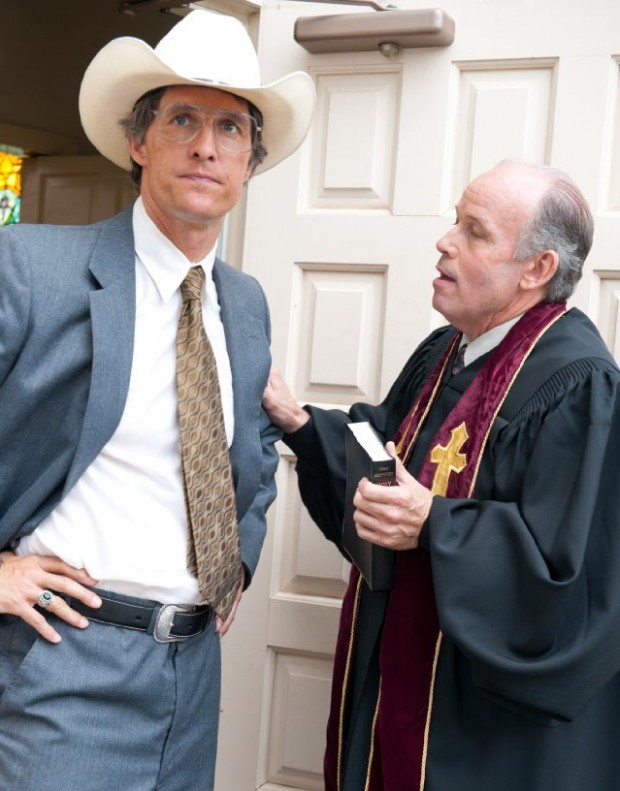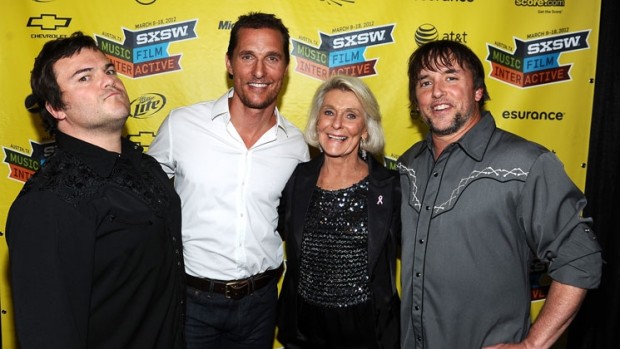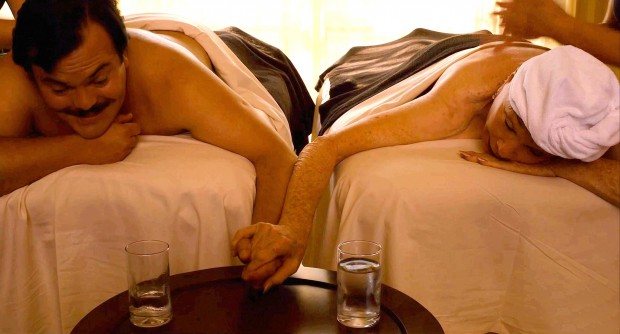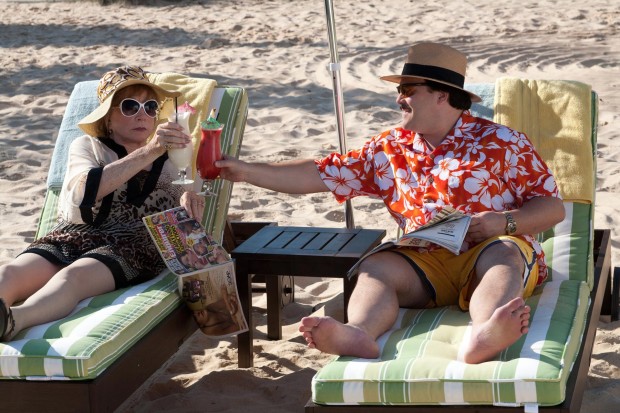
It may be tough to get a consensus reaction to Bernie. The latest Texas-based film from Richard Linklater changes tones throughout as it moves from comedy, dark comedy, to trial farce. The fact that it’s actually based on a real story of murder and regret is troubling to realize as you laugh and you begin to question whether someone who committed such a terrible crime is really troubled or just had a very bad day. I had the opportunity to sit down at SXSW for a roundtable interview with Linklater and Matthew McConaughey as we discuss the tone, meeting Bernie and the other real-life counterparts, and much more.
In some of your best movies you play a lawyer. There’s The Lincoln Lawyer, A Time to Kill, Amistad…and you wanted to be a lawyer originally?
Matthew McConaughey: I did. That’s where I was heading, and then luckily I ran into a friend, Don Phillips, in the right bar who introduced me to this guy and —
— and then you auditioned and no more law school.
MM: Yeah. I quit being a lawyer and moved on to do something else.
 You can act a lawyer.
You can act a lawyer.
MM: Yeah, much more fun.
How does Bernie fit into your “just keep livin” philosophy?
MM: Well, one of two things. Rick’s [Richard Linklater] really the only director I’ve worked with that can go, “Hey, McConaughey I’ve got a role in the next film I’m gonna do and I think you might be right for it.” He’s kind of said versions of that. The Newton Boys we talked about more but that isn’t an issue. The process of getting to the day of shooting is really fun for Rick and I. It’s a really fun process. There’s nothing formal about it at all.
Richard Linklater: Yeah. This one we were pretty dialed in, but it was crucial. A couple days of crucial rehearsal.
MM: And it’d just be he and I, one on one, and I always look forward to that. So that’s part of the “j.k. livin” philosophy right there. He’s a good friend, a guy I like to work with, a really talented director. [He’s] somebody that I’m gonna do the work. I’m gonna be serious about it, but I like to have fun. I always have fun working with Rick as well.
There’s obviously the opportunity to do some research, one-on-one research for this role. Did you have any resistance from some of the real-life people?
RL: I sought out Bernie himself. I started writing him just when it looked like the film was about to happen and then talked to Scrappy and Danny Buck also. That was fun. It was good to see Bernie. Jack [Black] wanted to go meet Bernie, so we did that and I’m so glad we did. It confirmed a lot of what I felt. I went to the trial over ten years ago, I was into it back then and felt I knew the guy. Just seeing him testify and seeing where he nails Bernie with the Les Miserables and all that. That’s all word for word, that all really happened. So, Matthew did a bunch of cool stuff around that, but the gist of that it’s tricky when you’re doing something based on real events, real people. I was concerned [for] the Nugent family and the survivors, but you just dive in and be as accurate as you possibly can.
Have you heard from the Nugent family? Or have you heard from any of the family members?
RL: Well, there’s just a son and some granddaughters floating around, nothing too formal. I don’t really expect anything formal.
What about Bernie’s family?
RL: She has a nephew who’s around. He’s actually coming tonight to the movie, so he visited the set, he’s a writer.

What was it like working with Skip [Hollandsworth]?
RL: Yeah, he’s a very beloved writer in these parts but it all started with him. Skip has that nose for a offbeat story and that’s what I responded to and I read the Texas monthly article way back when.
I know he’s involved with you writing the script but was he involved helping you develop the characters?
RL: No, I mean I worked with him on the script, over the years, but he was around. He visited when he could and I consider him a partner, all the way through. He had done so much research and he was great.
I noticed that it was his first screenplay that he had ever written.
RL: I think I have this way of just sort of pulling people into my world. Most people, you option the story and that’s it. Usually you would never talk to the director. Instead some agent calls, but I called him directly and started talking about how I grew up in East Texas. I was just talking about how much the story got to me, how much I liked it. I thought, “God, I really want to, I think that’s a movie, I really want to tell that story.” I think subconsciously I’ve been looking for an East Texas story, but I had some of my own, like a football related story I’ve been trying to tell for years. But that hadn’t quite come to fruition, so this was just one more story I was trying to get told. But I think its up to me to just include or not include and I kept including him. Why wouldn’t I? He had a good point of view and the appropriate dark twisted humor I think that the story kind of lends itself to so the more collaborators the better.
Why did you want to use the documentary style of interviewing the characters?
RL: Well, the main characters aren’t interviewed. I mean, they are but you’re talking about all the gossips. Yeah, the townspeople. I just thought, having grown up in a small town, and I hadn’t really seen that in a movie before. It’s just how I received the story. With Miss Nugent gone, Bernie in prison, not talking or on trial, you have no access to the two main players right. So, what are you in this world? You’re what everybody says you are. You gossip, you hear it from a lot of different angles, and I went through all of Skip’s interviews. I was reading a stack of journalistic notes, that’s when it hit me.
It’s like gossip, it’s all people saying different things, their own experiences. I got that little notion in my mind about gossip and thought that could tell the story. Think of Reds, there are movies that do interviews, they just have a different angle. Reds is historical, people looking back. This is kind of right in the mix. I went to the trial, I saw how people got excited. Socially, gossip is kind of a lubricant for a town. They do it, it’s a small town thing. It’s human, but it’s especially strong in a small town, so I thought people would understand that. But I never thought it was a documentary, though obviously when you have someone speaking, turning to camera it has that. But I just thought it was a story telling device.

I kind of saw it as a Greek chorus.
RL: Yeah, absolutely.
I like the structure of the film, light and whimsical at the beginning, and then it kind of goes dark and macabre. But when you were editing the film was there a point where we meet Matthew before the first thirty minutes?
RL: We had a bit where he comes in early. It was just interesting because it’s like, “well, that’s Matthew McConaughey. He’s just a townsperson.” It was when to bring him in, so how to feather him into the story. There was a few things earlier I ended up not using and got it more on to the message. There was a few things I ended up shortening, for that reason. But really Danny Buck shows up kind of when he showed up in their lives.
Matthew, how did he [Richard] describe the story to you? Just straight up on paper it can seem really, really dark if your kind of humor is a bit more whimsical.
MM: When he pitched the story and then I read it, I was pretty much on tone. I thought it was the funniest thing on paper that I read, that had his hand. I really thought it was very very funny. I always say there’s a bit of charm that you [Richard] give to a place. There’s something charming about this movie and there’s something innocent about it that’s attractive in that way, in that innocent charming way. So, I never read this and thought, “oh boy.” If I know it came from him as he actually pitched it to me for fifty minutes in his truck, and when I read it, I felt on page with the tone. I thought it was much more funny than I ever thought it was dark. I liked that it was dark comedy but I was just laughing.
RL: Yeah, that’s the appropriate tone. I don’t really think it’s dark. I mean it’s described as a dark comedy only because there’s a murder in it and that’s the darkest subject you can imagine. But in Bernie’s life, he only had a few seconds of darkness.

How exaggerated were the characters in the movie compared to their real life counterparts?
RL: Jack so nails the real Bernie. When we visited he picked up his walk. He was kind of working on an accent thing because we had some recordings of Bernie. I had some videos of him, like a one hour church service he had led and he had some recordings of him not only singing but talking. Jack was kind of working on the accent a little bit, but then when he finally met Bernie and got to hang in with him for a few hours, he dialed in that last little bit.
Were you [to Matthew] looking for a real change of pace from the loveable, romantic leading guy?
MM: Sort of. Just a different chapter, same book. I mean I’ll probably do some more of those. They’re fun in a very different kind of way. But, I just wanted to go do some [different films], and it actually ended up being five films. They’ve all been independents. The material was much more attractive, the budgets were much lower, but working on them, it’s just so much fun.
RL: We’re hoping to get a screening in the prison that Bernie’s in. I’ll talk to the Warden, she’s kind of up for it.
Where is he incarcerated?
RL: He’s up in New Boston. For a long time, we were doing the movie and he was down at the McConnell unit, down in B’Ville, like near the coast. But he got transferred to a new place just a bunch of them, they move them around like cattle. It’s pretty sad. I hope we get the chance.
Bernie hits limited release on Friday, April 27th.

